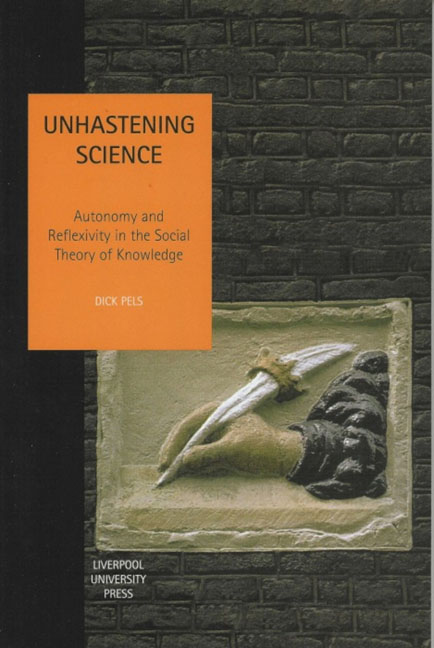Book contents
- Frontmatter
- Dedication
- Contents
- Acknowledgments
- 1 The Timescape of Science
- 2 What (Again) is So Special about Science?
- 3 Two Traditions in the Social Theory of Knowledge
- 4 The Natural Proximity of Facts and Values
- 5 Knowledge Politics and Anti-Politics: Bourdieu on Science and Intellectuals
- 6 The Politics of Symmetry
- 7 Reflexivity: One Step Up
- 8 Intellectual Autonomy and the Politics of Slow Motion
- Epilogue: Weak Social Theory
- Notes
- Bibliography
- Index
6 - The Politics of Symmetry
- Frontmatter
- Dedication
- Contents
- Acknowledgments
- 1 The Timescape of Science
- 2 What (Again) is So Special about Science?
- 3 Two Traditions in the Social Theory of Knowledge
- 4 The Natural Proximity of Facts and Values
- 5 Knowledge Politics and Anti-Politics: Bourdieu on Science and Intellectuals
- 6 The Politics of Symmetry
- 7 Reflexivity: One Step Up
- 8 Intellectual Autonomy and the Politics of Slow Motion
- Epilogue: Weak Social Theory
- Notes
- Bibliography
- Index
Summary
Symmetrical Delay
This chapter returns to a more in-depth investigation of some of the core methodological principles in the social studies of science and technology – a family of approaches that we have previously encountered as forming part of the Wittgensteinian impulse in the modern social theory of knowledge. As I have argued before, SSK and STS were drawn towards a form of value-free or ‘a-critical’ relativism that subdued the dilemma of reason vs. power but failed to rise conclusively above the residual dualism of facts and values. Their passion for detached ethnographic redescription and for ‘following the natives’ incurred a systematic normative deficit that diminished their critical flair, and undercut their capacity to tackle successfully the issue of the proximity or distance between observers and observed. It might then be interesting, at this point, to look more carefully into the various ways in which SSK and STS have sought to ‘translate’ the conventional demands of scientific detachment and neutrality in terms of their signature principle of symmetry.
In its initial incarnation in the Edinburgh Strong Programme, the principle of symmetry required social students of science to adopt an even-handed, agnostic approach to winners and losers in the scientific game, or to what scientists themselves generally considered as established truth and what they rejected as scientifically obsolete or erroneous. The sociology of knowledge should be ‘impartial with respect to truth and falsity, rationality and irrationality, success or failure’, which required it to be ‘symmetrical in its style of explanation. The same types of cause would explain, say, true and false beliefs’ (Bloor 1991 [1976]: 7; 1983: 2, 5; Barnes 1976; 1982: 4ff., 58–63). For Collins, these tenets defined the main thrust of the Strong Programme, focusing his own radical programme of empirical relativism in SSK (Collins 1981; 1983; 1991a). Others, such as Lynch and Roth, have likewise encircled symmetry and impartiality as constituting the methodological heart of radical science studies (Lynch 1992a; 1993: 75–77; Roth 1994). Operating in close alliance, they mesh into a type of ‘value-free relativism’ not too dissimilar from that of mainstream twentieth-century ethnography as it has evolved from Boas and Malinowski to Mead and Lévi-Strauss (Lemaire 1976; Stocking 1982 [1968]; Fabian 1983; Clifford 1988).
- Type
- Chapter
- Information
- Unhastening ScienceAutonomy and Reflexivity in the Social theory of Knowledge, pp. 130 - 156Publisher: Liverpool University PressPrint publication year: 2003



